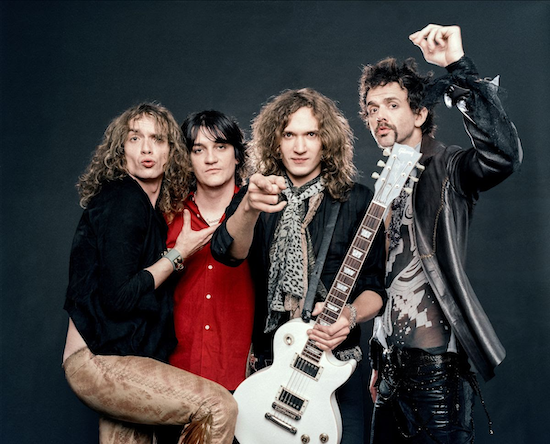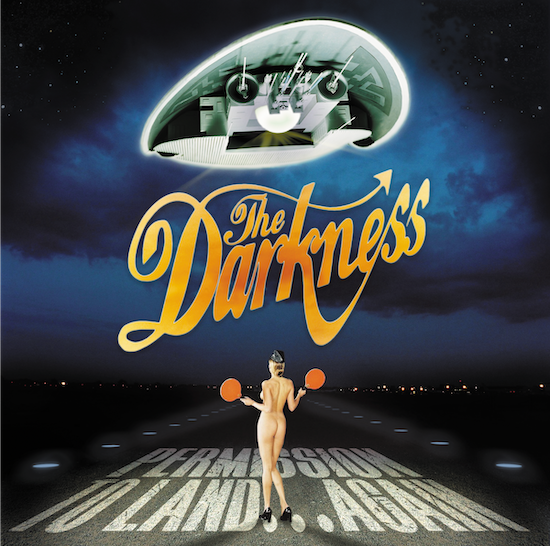The Darkness’ Permission To Land is the perfect album for nine year olds. At least that’s how it felt when I received a copy as a present at that age, given by a family friend who’d pluck out whatever was high in the charts for me when she visited. In what was an act of unfathomable transgression to a child hitherto listening chiefly to Busted and S Club 7, not only did I discover that the band use the word ‘fuck’ in the chorus of the first song ‘Black Shuck’ (“that dog don’t give a fuuuck”), but they also used it just as liberally in the chorus of the second, ‘Get Your Hands Off My Woman’ (“motherfuuuckeeeeer”). The songs were bouncy and fun and immediate, an ideal soundtrack for the aimless charging about that then occupied most of my time.
The story usually goes that being introduced to this sort of music as a child acts as a gateway to the more ‘serious’ stuff from which it draws, yet I have never been bothered about the glam metal and stadium rock The Darkness were referencing. I took the record entirely on its own terms, and then moved on to indie, and later experimental music as I grew up, believing – perhaps naively – that they were somehow deeper and more worthy forms of music.
20 years later, listening to a new anniversary reissue of the record as part of a boxset called Permission To Land… Again, I feel the band’s genuinely impressive ear for melody a little more, and wince a little as I scan one or two of the clunkier lyrics (“You are drunk and you are surely in Latino lover mode,”) but more than anything it evokes the same kind of childish joy that I felt as a nine year old. I still struggle to find much to The Darkness beyond that surface-level barrage of falsetto and overdrive, and yet it’s a barrage that satisfies completely. I desire nothing more and nothing less.
Sifting through the demos and rarities packaged alongside the original album reveals little in the way of fascinating alternative directions the band might have pursued. On the early demos of songs that eventually made the album, the biggest deviations come in the form of a spoken word introduction set to an elfin chime at the beginning of the demo of ‘Black Shuck’, a glitzy synth part that clutters the chorus of ‘I Believe In A Thing Called Love’, and a slower, chunkier version of ‘Love On The Rocks With No Ice’ that benefits from the added heft.
Similarly, the B-sides and bonus tracks in the new boxset offer mainly a re-affirmation of The Darkness’ straightforwardness. Rather than use away-from-the-spotlight releases as a chance to take away the pressure to conform to a certain sound (intriguing cowboy rock & roller ‘Curse Of The Tollund Man’ being the exception) they use them to double down. This can be for better – ‘Planning Permission’’s preposterous expression of love through the metaphor of building a conservatory, the rollicking stomper ‘The Best Of Me’ and the Powerage-indebted ‘Physical Sex’ – and for worse; often Hawkins’ effort to ramp up the rock & roll lands him at little more than caveman horniness as on the icky ‘Makin’ Out’. The most charitable way of viewing the B-side ‘How Dare You Call This Love’ meanwhile – sample lyric “You’re so young it’s obscene / I can’t wait for the day you turn 16” – is as a blunt satire of rock stars’ historic tendencies towards relationships with underage women. Even when read with the best of faith, however, it’s rancid. In a track-by-track section of the liner notes the issue is noticeably skirted, the lyrics described merely as “a bit risqué”.
Thankfully such moments are in the minority. Taken as a whole the material collected here hasn’t aged all that badly; the group were so at odds with the zeitgeist when they arrived in the first place, that they’re essentially able to sidestep the issue of sounding dated anyway. Most of all it merely strengthens the argument that The Darkness were a band who knew from the very start that they were to be all about immediacy; early pub gigs, by all accounts, were performed with the same bombast with which the band would later headline arenas. In an extensive interview that serves as the liner notes to the physical release, the band recall that even in his pre-Darkness days, a teenage Justin Hawkins tried (and failed) to perform guitar solos behind his head during his first gig with a band called Biff, and then found local notoriety in his native Lowestoft opening for a local pub covers band under the name Bionic Reg, performing on guitar to a drum track wearing a purple tailcoat and a helmet.
In a recent interview, guitarist Dan Hawkins recalls his frontman brother squeezing into his trademark catsuit in the toilet before an early club show – white, with thunderbolts on the legs, and see-through with sweat a few songs in. A 2008 feature in The Guardian following The Darkness’ initial split recalls Justin performing “as if he were headlining Wembley” when the group played one of their first shows to an audience of four people; "I want to dedicate this song to four very special people," Justin reportedly bellowed across the pub. "They know who they are." In the liner notes he recalls informing a prospective new manager, confused about how much of their act was schtick, that “I do all that stuff in rehearsals as well. If there’s a box to stand on for a guitar solo, I’m up on it.”

Photo by Scarlett Page
Though these sides to The Darkness were often written off as affectations, the implication being that they were tacked on in an effort to set the band apart, what’s obvious from Permission To Land… Again is that they were inherent to their core identity from the earliest stages. Furthermore, because The Darkness never filtered them down, it meant that when they broke big they were fully formed to an extent few bands can enjoy so early on in their career, and therefore that Permission To Land is as complete a vision as a band at that stage could hope to deliver. Their vision might be one of surface-level gloss and a heavy dose of daftness, but that doesn’t make it any less coherent, nor any less valid.
The totality with which The Darkness embraced flamboyance is part of the reason their debut album succeeds, and the reason that as a child I could take it entirely on its on terms, with no deep digging required in order for me to ‘get’ it. Crucially, however, this is not to say that they were not also taking their work entirely seriously. Their sense of humour is all over the record, but it’s a sense of humour that doesn’t base itself on mere parody. The balance between these two sides is probably best exemplified by that between the Hawkins brothers themselves. “Things that are cartoonish and ridiculous – that’s my raison d’être. The ridiculous things that the Darkness do are tempered by Dan’s actual good taste,” Justin recently told The Guardian. It means that on Permission To Land The Darkness could walk a delicate line, self-aware enough to avoid getting caught up in the ‘saviours of rock & roll’ hype that makes their closest modern successors Måneskin and Greta Van Fleet so tedious, yet serious enough that the songs themselves hold up.
Of the three separate live recordings compiled on Permission To Land… Again, supporting Robbie Williams on his huge summer 2003 shows at Knebworth, a high-intensity Astoria show and a triumphant Wembley headline set, it’s the first that makes the most interesting listening. Here, the band are heard playing to a crowd of 100,000, few of whom one assumes were actually there to see them, and in real time you can hear Justin Hawkins winning over vast swathes of them. Towards the end he asks outright who amongst them has been converted, receiving a great roar in response. “Everybody else, repeat after me,” he declares. “’I. AM. WRONG.’”
Permission To Land… Again is released on multiple formats on October 6 via Warner


